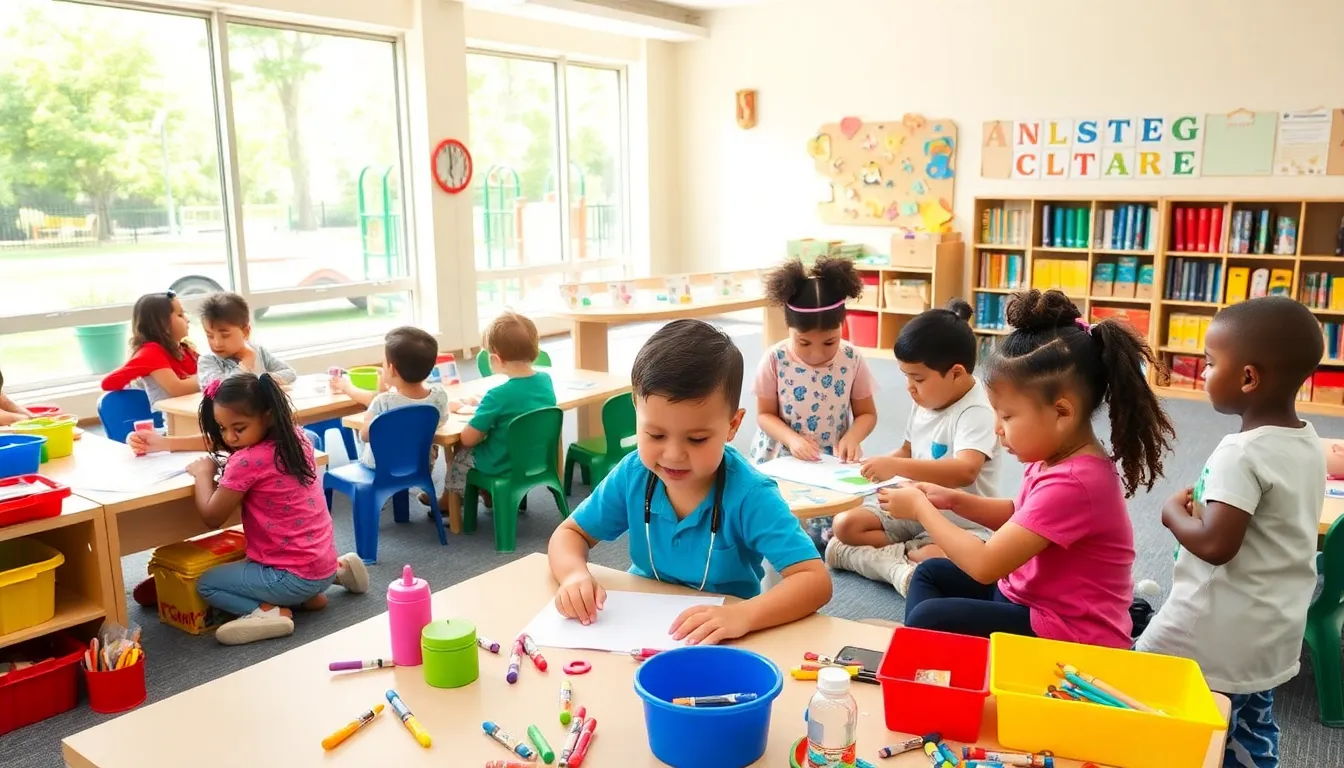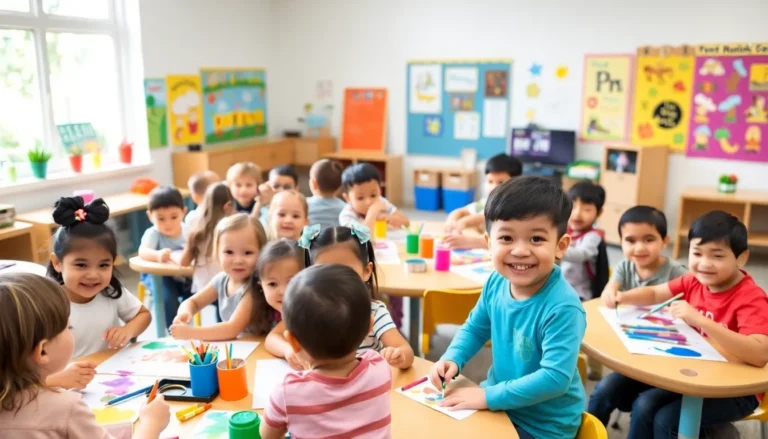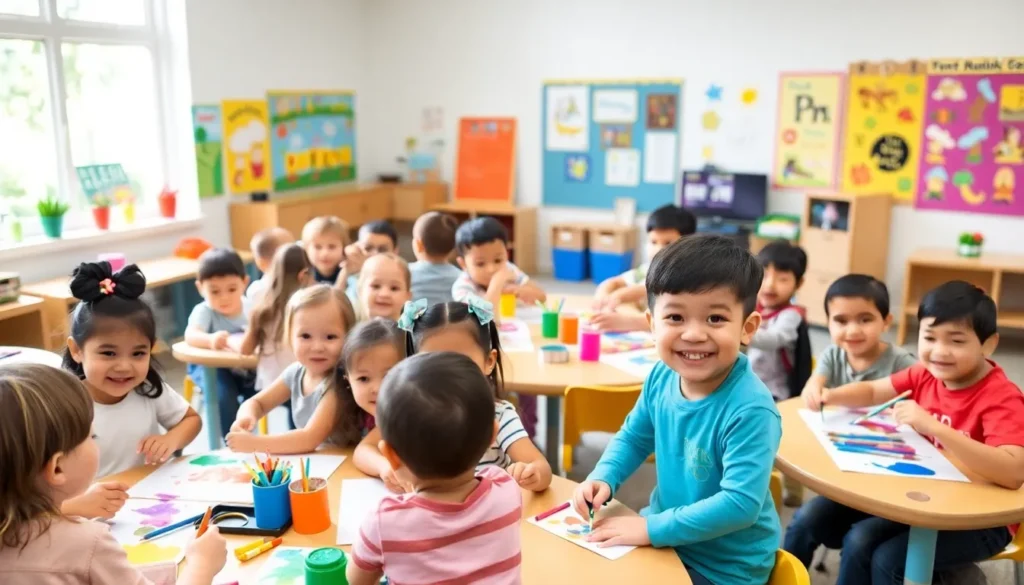Table of Contents
ToggleNestled in the heart of the city, the Central Park Early Learning Center is where curiosity meets creativity. Imagine a place where little ones explore their imaginations while learning to navigate the big, beautiful world around them. From playful art projects to interactive storytelling sessions, this center transforms learning into an adventure that even the most energetic toddlers would approve of.
Overview of Central Park Early Learning Center
Central Park Early Learning Center serves as a vibrant environment for children, fostering creativity and curiosity. Through engaging activities, it transforms learning into an exciting adventure for toddlers.
Mission and Vision
Central Park Early Learning Center aims to provide a nurturing space where young minds can thrive. Its vision revolves around cultivating a love for learning that extends beyond the classroom. Critical thinking, creativity, and collaboration are prioritized. The center educates children using a holistic approach, focusing not only on academic skills but also on emotional and social development. Through diverse programs and targeted initiatives, it encourages children to explore their potential and develop lifelong skills.
Program Structure
Central Park Early Learning Center features a well-rounded program structure that caters to various age groups. Each class promotes interactive learning, allowing children to engage in hands-on activities. Specific programs like art, music, and storytelling enhance cognitive and social skills. Educators implement a curriculum designed to inspire curiosity and foster creativity. Regular assessment ensures that children are progressing and receiving support tailored to their individual needs. Outdoor play also plays a crucial role in the curriculum, helping children develop physically and socially in a safe environment.
Curriculum Highlights

Central Park Early Learning Center emphasizes a dynamic curriculum that nurtures children’s growth and development. The structure accommodates diverse learning stages, fostering a rich educational experience.
Age Groups Catered
Infants aged six weeks explore sensory activities. Toddlers between 12 to 24 months dive into interactive play that enhances language skills. Preschoolers aged 2 to 5 focus on developing social and emotional intelligence through group activities. Each age group benefits from a tailored approach to learning that encourages independence. Educators design programs that align with developmental milestones while fostering curiosity. Daily schedules include both structured and unstructured time to enrich learning.
Learning Approaches
The center adopts a hands-on learning philosophy, embracing experiential education. Storytelling sessions captivate young minds and promote literacy. Creative arts projects stimulate imagination, offering various mediums for expression. Music activities support cognitive development through rhythm and melody. Children engage in problem-solving activities that boost critical thinking skills. Regular assessments inform educators about each child’s progress, ensuring personalized support. Outdoor playtime promotes physical health and social skills in a natural setting. Active participation is encouraged, making learning both fun and impactful.
Facilities and Resources
Central Park Early Learning Center provides a well-structured environment designed for early childhood education. The facilities encourage exploration and foster learning through various resources.
Classrooms and Learning Spaces
Classrooms promote creativity and collaboration. Each space is tailored to accommodate different age groups, ensuring age-appropriate learning experiences. Decorated with educational materials, they stimulate curiosity and engagement. Learning materials include art supplies, sensory tools, and books that enhance cognitive development. Flexible furniture arrangements encourage teamwork and interactive activities. Natural light floods the rooms, creating a warm atmosphere conducive to learning. Teachers facilitate discovery, guiding children through structured and unstructured play.
Outdoor Areas and Playgrounds
Outdoor areas offer ample space for physical activity and social interaction. Playgrounds include climbing structures, slides, and open grassy areas for free play. Safety features protect children while they engage in various outdoor games. Gardens enhance sensory experience, allowing kids to connect with nature. Structured outdoor activities, such as group games and nature walks, promote physical health. Regular access to these areas supports social skills and cooperative play, making outdoor time an essential component of the curriculum. Children thrive by building confidence and independence while exploring their environment.
Staff and Qualifications
The Central Park Early Learning Center prioritizes qualified and dedicated staff. Educators possess essential credentials and training to support children’s growth effectively.
Educator Credentials
Educators at the center hold degrees in early childhood education or related fields. Many staff members also have certifications in first aid and CPR. Continuous professional development ensures each teacher stays updated on best practices in early childhood education. Experience in diverse classroom settings enriches the learning environment. Regular workshops and training sessions enhance teaching skills, ensuring that educators provide the highest quality of care and instruction. This commitment to professional growth results in a nurturing atmosphere where children thrive.
Child-to-Teacher Ratio
The child-to-teacher ratio at the Central Park Early Learning Center meets or exceeds industry standards. In infant classrooms, the ratio is typically 3:1, allowing for individualized attention. For toddlers aged 12 to 24 months, the ratio is 4:1, fostering a supportive learning environment. Preschool classrooms, accommodating children aged 2 to 5, maintain a 6:1 ratio to encourage social interactions and personal growth. Lower ratios facilitate stronger relationships between children and educators, ensuring needs are met effectively. This structure enhances learning experiences, supporting each child’s development journey.
Parent Involvement and Community
Central Park Early Learning Center prioritizes strong parent involvement and community engagement. The center values open communication between educators and families, fostering a collaborative environment that enhances children’s learning experiences.
Communication Channels
Regular newsletters keep parents informed about classroom activities and important dates. Parents receive updates through emails and a dedicated app, ensuring they stay connected with the center’s daily events. Additionally, parent-teacher conferences provide opportunities for one-on-one discussions regarding each child’s progress. Engaging parents in their children’s education strengthens the partnership between the center and families.
Events and Workshops
The center hosts various events and workshops throughout the year to build community ties. Seasonal celebrations encourage family participation, highlighting children’s achievements and creativity. Workshops focus on parenting skills and child development topics, providing valuable resources for families. These gatherings create a supportive network for parents and caregivers, promoting an inclusive atmosphere at Central Park Early Learning Center.
Central Park Early Learning Center stands out as a nurturing environment where children thrive through creative exploration and hands-on learning. Its commitment to fostering independence and curiosity ensures that each child’s unique journey is supported and celebrated. With a dedicated staff and a focus on community engagement, the center creates a collaborative atmosphere that enhances children’s educational experiences. Parents can feel confident knowing their little ones are in a place that prioritizes both academic and emotional development, setting a strong foundation for lifelong learning.







